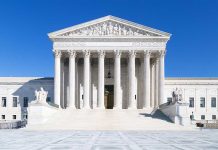
Allegations of James Comey authorizing leaks and expecting to serve under Hillary Clinton challenge the integrity of the 2016 election investigations.
Story Highlights
- Alleged emails suggest Comey authorized leaks and anticipated a Clinton presidency.
- The accusations imply potential political bias in the FBI’s 2016 investigations.
- No credible evidence of such emails has been made public as of 2025.
- The controversy continues to fuel partisan debate over FBI integrity.
Allegations Against Comey
In an explosive twist, allegations have surfaced suggesting former FBI Director James Comey authorized leaks of sensitive information and expected to work under a Hillary Clinton presidency. These claims, if true, would mark a significant breach of impartiality in the FBI’s investigations during the 2016 election. The controversy revolves around internal emails that supposedly reveal a bias in Comey’s actions during the Clinton email probe. However, official investigations have yet to confirm the existence of these emails.
The allegations center on the notion that Comey expected a Clinton victory and may have acted in a way that favored her campaign. Critics argue that this undermines the integrity of the FBI’s role in such a politically charged investigation. Yet, as of 2025, no authenticated emails have been made public that corroborate these claims. This has left a vacuum of speculation and fueled partisan narratives, particularly among conservative circles who view this as emblematic of deeper institutional biases.
Official Investigations and Findings
Despite these allegations, the most comprehensive review of the matter remains the DOJ Inspector General’s 2018 report. This investigation found no evidence of political bias in the handling of the Clinton email probe by the FBI. It concluded that Comey’s actions, while controversial, did not constitute criminal conduct or overt political favoritism. The report has been widely cited in defense of Comey’s decisions, though it has not quelled the ongoing public debate.
Comey has consistently defended his actions, stating his intention was to protect the FBI’s integrity rather than influence the election outcome. The Department of Justice and the FBI have reiterated the findings of the Inspector General, emphasizing the lack of evidence for the alleged emails. Nonetheless, the story continues to be a focal point for those questioning the FBI’s impartiality during a highly contentious election cycle.
Long-term Implications
The allegations against Comey have left a lasting impact on public trust in federal institutions. The ongoing debate contributes to a broader skepticism about the impartiality of law enforcement in politically sensitive investigations. This case highlights the challenges faced by agencies like the FBI in maintaining public confidence while operating under the scrutiny of partisan interests. As the story unfolds, it serves as a reminder of the delicate balance between transparency and political influence in federal investigations.
While the controversy adds to the narrative of institutional bias, it is crucial for the public to rely on verified and credible sources. The allegations of Comey’s misconduct remain unsubstantiated, yet they shape the discourse around FBI operations and the handling of sensitive cases in the political arena. In the absence of concrete evidence, the episode underscores the importance of thorough and impartial investigations to maintain public trust and uphold democratic principles.
Sources:
The James Comey Saga in Timeline Form
Hillary Clinton Email Controversy
Timeline: Hillary Clinton’s Email Saga
NPR Coverage on Comey and FBI Controversy











